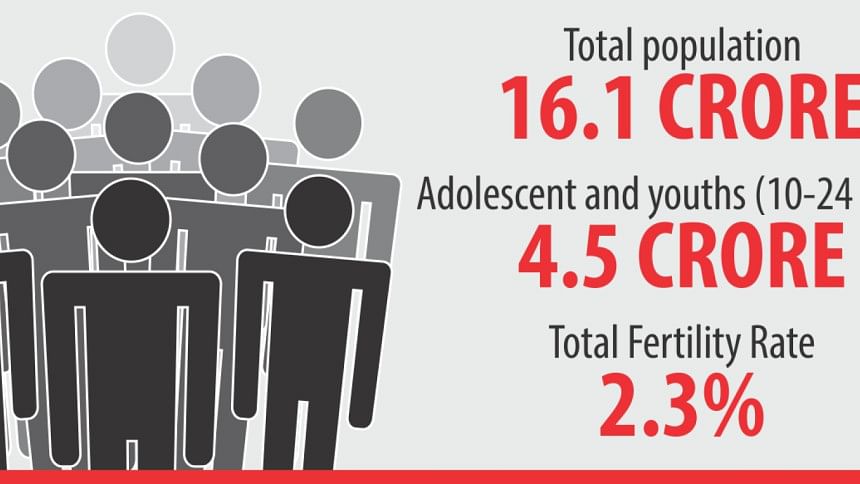Focus on health of adolescents

The government plans to open adolescent-friendly corners at every Union Health and Family Welfare Centre in the country within the next five years to provide reproductive and sexual health services, with 100 such corners already serving.
The health and family welfare ministry revealed this at a press conference yesterday. It is set to observe World Population Day tomorrow with the theme “Investing in teenage girls” to highlight health needs of adolescent girls.
State Minister for Health Zahid Malik at the conference said more than 4.5 crore or 31 percent of the country's 16.10 crore population are adolescents and youths (between 10 and 24 years).
“This is the demographic window of opportunity for Bangladesh. If we can formulate a proper development strategy and a plan of action to prepare them and create scopes for jobs, we can significantly improve our socio-economic status like that of Southeast Asia and Europe,” he told journalists.
Of the 4.5 crore, teenage girls are more vulnerable to deprivation of education and healthcare. In a recent interview with The Daily Star, Country Representative of United Nations Population Fund (UNFPA) Argentina Matavel Piccin described teenage girls as “forgotten part of the population”.
According to the 15-year programme -- Sustainable Development Goals (SDGs) adopted by the UN late last year -- nobody will be left behind. So, attention should be given to education and health issues of teenage girls, one of the important segments of the population.
The government has already moved to improve health services for adolescents, especially girls, through the setting up of health corners.
Adolescent-friendly corners will have a trained family welfare visitor or a sub-assistant community medical officer, said Dr Mohammad Sharif, director (maternal and child health) at the Directorate General of Family Planning (DGFP).
With USAID funds, the DGFP will gradually set up such facilities at all 4,337 family welfare centres in the next five years under health, population and nutrition sector development programme.
“Adolescents can come and undergo counselling regarding their reproductive and sexual health. It will be a separate room so that they can freely discuss their problems,” Sharif said.
Adolescents go through mental and physical changes, and many of them do not get proper information or guidance. These issues, including teenage girls' menstruation and hygienic practices, will be addressed.
Regarding services to married adolescent girls, the director said some vitamins, including folic acid tablets, iron and calcium tablets would be provided free of cost.
State Minister Zahid Malik said 59 percent of girls in Bangladesh get married before they reach 18 with their education shelved forever. Many of them get pregnant and face risks of death and malnutrition of their children.
Child marriages also lead to more domestic violence as they are not capable of negotiating with their partners, he said, adding that the rate of using modern contraceptives is low (47 percent) among married adolescent girls (15-19 years).
In the 65th UN General Assembly, Prime Minister Sheikh Hasina emphasised the importance of improving reproductive and sexual health of adolescents and youths.
With that in mind, Zahid said, “We are setting up adolescent-friendly health corners.”
World Population Day is globally observed on July 11, but the government this year changed the date due to Ramadan and Eid-ul Fitr vacation.

 For all latest news, follow The Daily Star's Google News channel.
For all latest news, follow The Daily Star's Google News channel. 



Comments